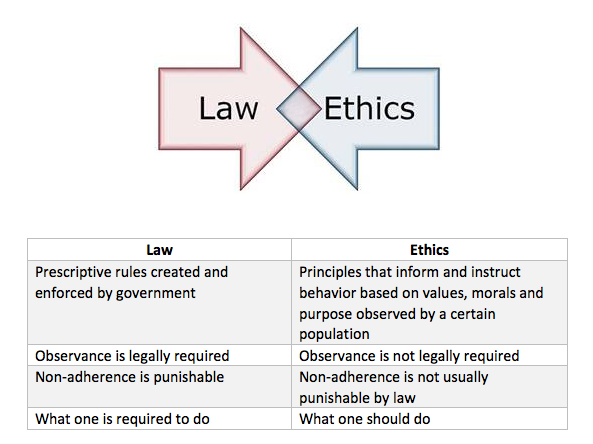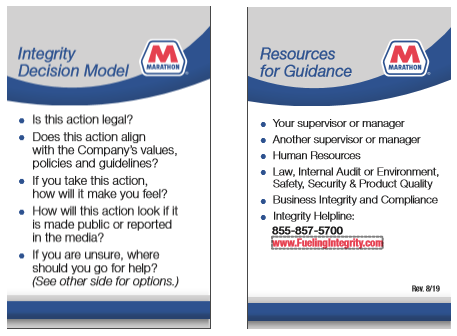Q3-4 2019 Integrity Advocate
Compliance + Ethics = Business Integrity
We are expected to perform our jobs with business integrity. This includes acting with the highest standards of ethics and compliance. We are quick to refer to these terms as fundamental to our core value of integrity. But do we really know what they mean? Many refer to ethics and compliance as being different sides of the same coin. Sometimes the terms ethics and compliance are used interchangeably. What is the difference?
Compliance Focuses on the Law
One way to think about compliance is that it represents the letter of the law. It’s what we are required to do because the government says we must. Compliance is about obedience to rules, policies and procedures.
As Marathon is a publicly traded company operating in a heavily regulated industry, a myriad of laws govern how we conduct business. It’s impossible to have legal operations without complying. We must abide by these laws to prevent serious consequences that can involve fines, sanctions, jail time, legal liabilities and negative consequences for involved or affected employees. But compliance, absent ethics, is about nothing more than doing the minimum required to comply with basic requirements. We aspire to more.
Ethics Calls for Doing What Is Right
If compliance is about the letter of the law, ethics is about the spirit. While compliance is about rules, ethics is about the values, principles, and purpose that help individuals make decisions that are in line with ethical standards of society or an organization. Ethics serves as a guide in drawing a line between right and wrong regardless of what the law says. That is, doing what one should do versus what one is required to do.
In business ethics, integrity describes how people live the values in which they say they believe. For a company to have integrity, it needs to know what its values are and strive for conduct that models those behaviors. Ethics is principled decision making by which one commits to acting with integrity even when no one is watching and even when it may not be to the person’s advantage.

Why Does it Matter?
Companies who operate in the same industry must comply with the same laws, rules and regulations as one another. However, some rules and regulatory guidelines are not clear, haven't been tested by case law, or may simply be interpreted loosely. This creates an opportunity for companies to utilize differing strategies when adhering to these requirements. In many cases, ethics may be the radical variable that sets one company apart from its competitors.
Compliance Plus Ethics
It is Marathon's strategic business commitment to conduct business such that compliance acts as our minimum level of conduct and our decisions are driven by the highest standards of ethics. The combination of compliance and ethics equals a culture of business integrity, our commitment to which ensures that we operate with the accountability, transparency, honesty, respect and dignity needed to continue to maintain valued business relationships inspired by trust with all of our stakeholders and constituents.
Ethics is integrated with the company's core values of health and safety, environmental stewardship, integrity, corporate citizenship, and inclusive culture. We practice ethical decision making in our business because that is who we are and what we stand for. It gives us a competitive advantage and makes us proud of our brand and performance in the marketplace.
The relationship between compliance and ethics can be complex when faced with making business decisions. When faced with such a dilemma, consult the Integrity Decision Model and know where to go to seek guidance.

2019 Business Integrity and Compliance Partners Meeting to Feature
Hui Chen
Integrity Starts with You.
On Monday, October 28, Business Integrity and Compliance (BI&C) hosted its annual BI&C Partners Meeting on the Findlay Campus. Nearly 60 Partners from across the company were onsite in Findlay for a day of leadership programming focused on business integrity, compliance and ethics. More information about the BI&C Partners Program can be found here.
 This year’s Partners Meeting featured a keynote address by Hui Chen, former United States Department of Justice (DOJ) counsel and internationally renowned expert in corporate compliance and ethics. Among other topics, Ms. Chen addressed anticorruption compliance as part of a broader discussion on effective ethics and compliance programs and the role of employees as integrity advocates. The event also included a panel discussion featuring Ms. Chen and highlights of MPC’s Compliance and Ethics Program.
This year’s Partners Meeting featured a keynote address by Hui Chen, former United States Department of Justice (DOJ) counsel and internationally renowned expert in corporate compliance and ethics. Among other topics, Ms. Chen addressed anticorruption compliance as part of a broader discussion on effective ethics and compliance programs and the role of employees as integrity advocates. The event also included a panel discussion featuring Ms. Chen and highlights of MPC’s Compliance and Ethics Program.
Ms. Chen’s keynote address and the panel discussion was recorded and portions will be made available in future forums.
A leader in compliance and ethics, Ms. Chen regularly consults with companies as well as regulatory and enforcement authorities around the world, advising them on the design, implementation, and assessment of ethics and compliance programs. Ms. Chen is also a thought leader who collaborates with leading academic researchers and publishes regularly in business and academic journals.
As the first-ever Compliance Counsel at the DOJ, Ms. Chen was the exclusive consultant to the federal prosecutors in the Fraud Section, evaluating corporate ethics and compliance programs in areas such as anti-fraud, anti-bribery/kickback, healthcare, quality control, manipulation of financial markets, process safety, and environmental protection. She is the author of the Fraud Section’s well known “Evaluation of Corporate Compliance Programs,” which has been widely praised by compliance practitioners and recognized by government regulators and standard setters around the world. She also consulted on all Fraud Section corporate monitorships, including hosting training for monitors on best practices and lessons learned. After leaving the DOJ, Hui was retained as the first-ever foreign expert consultant by the Ministry of Transparency of Brazil to assist the Comptroller General’s Office (CGU) in the development of methodologies for evaluating corporate compliance programs.
Prior to being retained by the Department of Justice, Ms. Chen served as a senior compliance leader in industries such as technology (Microsoft), pharmaceutical (Pfizer), and financial services (Standard Chartered Bank). In those roles, Ms. Chen worked closely with business leaders in
• designing and implementing compliance programs,
• conducting risk assessments,
• supervising global internal investigations, and
• enhancing compliance and financial processes and controls.
Ms. Chen is well versed in the practicalities of working in matrix organizations and meeting the demands of business and operational necessities. She is also keenly attuned to cross-cultural business challenges, having lived and worked in New York, Washington, D.C., Munich, Moscow, Beijing, London, and Milan, and conducted risk assessments, training, and investigations throughout North and South America, Europe, Asia Pacific, and Middle East.
It Happened Here
The following scenarios happened with employees at our company. Situations and descriptions have been edited to maintain anonymity and confidentiality.
Click arrows below to view the company response to the concern.
The Concern: Employee operated company vehicle while driver’s license under suspension.
The Response: Investigation found that employee falsely reported validity of driver’s license and had in fact operated a company vehicle with a suspended license. Employee no longer works for the company.
The Concern: Employee created fake invoices for supposed maintenance work and materials and submitted them for cash payout.
The Response: Employee no longer works for the company and is subject to criminal prosecution.
The Concern: Manager shared an employee’s personal information with a customer who happened to be a relative of the employee.
The Response: Investigation confirmed allegation and manager was counseled.
Integrity starts with you. Each of us plays a role in shaping the ethical culture in our workplaces. You are an integrity advocate when you report suspected misconduct. You are also an integrity advocate when your business conduct reflects our culture of integrity. Indeed, being an advocate is about speaking up not only about what may be wrong, but also about what is going right.
As one example, a recent article in The Buffalo News[1] related to Marathon Petroleum’s acquisition of 33 of Noco Energy Corporation’s convenience stores and a fuel terminal. According to the article, James Newman, Noco Energy’s President, said this was a complicated deal to complete, given the number of sites and the complexity of a facility like the fuel terminal, but that no major issues surfaced with Marathon officials. Newman is quoted as saying, “they were very good people to deal with, and they did what they said they were going to do.”

Examples of ethical conduct such as these should be highlighted and celebrated! We invite you to help expand the scope of “It Happened Here” to include positive stories of integrity in action in future issues of the Integrity Advocate by submitting them to Business Integrity and Compliance, RoomM01004 Findlay Campus or [email protected].
[1] Noco Express stores start switch to Speedway, The Buffalo News (July 16, 2019)

